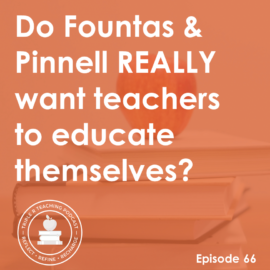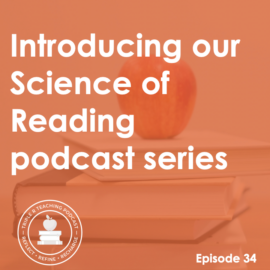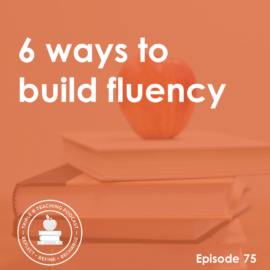
TRT Podcast#9: Easy books to get you started with the science of reading
Ready to start learning about the science of reading? Here are some books to get you started!
Listen to the full episode
Full episode transcript
Hello, Anna Geiger here, and today I'm going to share easy books to get you started learning about the science of reading. There are countless books about the science of reading being published all the time. I should know, my shelves are full of them, but not all of them are accessible for the person who is new to the science of reading. Today I'd like to share some that I believe are best to start with.
If you are coming from a balanced literacy background and you're feeling a little apprehensive about the science of reading, I would start with "Shifting the Balance" by Jan Burkins and Kari Yates. Their book is really designed for the balanced literacy teacher who's trying to wrap their brain around all these "science of reading" things, who is trying to understand the research that they maybe weren't aware of before. It's really a beginner's guide, and it's a good place to start.
Some people who are really into the science of reading aren't crazy about it, they say it doesn't go far enough, but I think it's a great starting spot. It will help you think about things like using decodable books vs. leveled books, rethinking MSV, thinking about where comprehension begins, and a lot more. It's very easy to read, and it will get you started.
After that, I would recommend "Know Better, Do Better" by David and Meredith Liben. I love this book because the authors tell the story of how they started a school, I believe it was a New York City, and it was a whole language school back in the '90s. They really felt that they were doing everything they could to ensure their students became readers. I believe they had a pretty good budget, so they could purchase lots of literature and other things to really get their students set up for success.
But to their surprise, their students did very poorly on the tests. Despite having what they believed that their students needed to learn to read, they were wrong. The students actually needed explicit instruction, and so they switched things around and they found that teaching students with a structured approach can still lead to joyful readers. It's an excellent, easy to read book, and it's not too long.
After that, I would recommend Christopher Such's book, "The Art and Science of Teaching Primary Reading." It's a pretty new book, short, and very comprehensive.
And finally, Lyn Stone's book, "Reading For Life." Now, if you're a balanced literacy teacher, I would not start with Lyn Stone's book because there's a fair amount of snark in there toward balanced literacy, which I found a little offensive the first time I read it. Now I love the book, but when I still had a leg in balanced literacy, I wasn't crazy about it. But it's excellent and I recommend that one and all of her books.
After you finish these four books, you can get into some books that are a little more meaty, which I'm going to share next week.
Here's a quick recap, the books I recommend starting with are "Shifting the Balance" by Jan Burkins and Kari Yates, "Know Better, Do Better" by David and Meredith Liben, "The Art and Science of Teaching Primary Reading" by Christopher Such, and "Reading For Life" by Lyn Stone. You can find links to purchase these books in the show notes for this episode at themeasuredmom.com/episode9.
See you next time!
Sign up to receive email updates
Enter your name and email address below and I'll send you periodic updates about the podcast.
Books mentioned in this episode
- Shifting the Balance, by Jan Burkins and Kari Yates
- Know Better, Do Better, by David and Meredith Liben
- The Art & Science of Teaching Primary Reading, by Christopher Such
- Reading for Life, by Lyn Stone







Cari C.
I’m frustrated that my very well-funded public library does not have a single one of these suggested books! Where does a teacher go to borrow books to improve their teaching?
Anna Geiger
I have noticed that public libraries have very little in the way of professional development books. 🙁 Perhaps you could get a card to a local university library, or work with fellow teachers to buy a title, then share it.
mai
Thank you so much.This is very helpful.
Radhika
Beautifully explained. Thanks for sharing this.
Bertha
Thanks so much for sharing tips on how to help little ones.
Doris Riley
Thank you, for the information.
Kathy Schreiber
Thank you! I shared this with all my young teacher friends who are now home doing double duty; teaching students online and teaching their own children at home. I thought this was very insightful!
Tumoa N Meere
Thank You Anna, much appreciated!
Beth
Thank you! This is very helpful.
Donald
Always useful!
Corina Forzani
Ops , I meant podcast episodes, 1-8.
Gigi Valencia
You can find these on her Apple Podcast or even on Spotify under this link.
“Triple R teaching”
hope this helps!
https://podcasts.apple.com/us/podcast/triple-r-teaching/id1498200908?i=1000469999944
Anna G
Thanks Gigi! Corina, you can also find them here: https://www.themeasuredmom.com/triplerteachingpodcast/
Barb Hammers
Anna,
This was helpful. I feel very unprepared for my new normal! Also, am sharing this with my daughter.
Corina Forzani
Hi Anna, where can I find tips, 1-8?